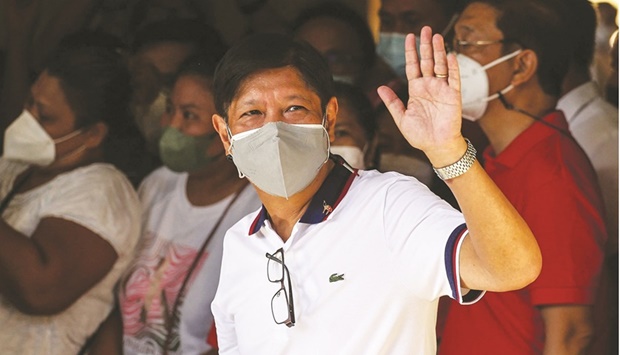Ferdinand Marcos Jr was headed for a stunning victory in the Philippines’ presidential election yesterday with double the votes of his nearest rival, putting the son of the notorious late dictator on the cusp of a historic political fightback.
An unofficial tally by the election commission showed Marcos, 64, was close to passing the required 27.5mn votes to secure a majority in a presidential election for the first time since the end of his father’s 1965-1986 rule.
The count makes almost certain a previously unthinkable return to power of the Marcos family, 36 years after its humiliating retreat into exile after being toppled in a “people power” uprising.
“I hope you won’t get tired of trusting us,” Marcos told supporters in remarks streamed on Facebook, a platform at the heart of his campaign strategy.
“We have plenty of things to do,” he said, adding “an endeavour as large as this does not involve one person.”
Marcos Jr had 26.3mn votes, more than double the 12.5mn votes for Leni Robredo, the vice president, with 81.8% of the eligible ballots counted, according to the unofficial Commission on Elections (Comelec) tally.
Despite its fall from grace, the Marcos family returned from exile in the 1990s and has since been a powerful force in politics, retaining its influence with vast wealth and far-reaching connections.
Marcos Jr has served as a governor, congressman and senator, his sister, Imee, is currently a senator and mother Imelda, the influential power-broker and widow of the late dictator, served four terms in the House of Representatives.
Marcos has presented no real policy platform, campaigning on a simple but ambiguous message of unity. His presidency is expected to provide continuity from outgoing leader Rodrigo Duterte, whose ruthless, strongman approach proved popular and helped him to consolidate power rapidly.
A major boon has been Marcos securing Duterte’s daughter, Sara Duterte-Carpio, as his running mate, tapping her father’s support and helping him to make inroads in new voter territory.
The unofficial tally showed Duterte-Carpio winning the vice presidency by a massive margin.
Marcos was criticised for skipping presidential debates and made few media appearances during the campaign, enabling him to limit scrutiny and control his message via a network of influencers and bloggers granted broad access to his events.
The results demonstrate the huge success of a sophisticated social media operation by Marcos, which critics say has sought to discredit historical accounts of cronyism, plunder and brutality during his father’s authoritarian rule, about half of which was under martial law.
The Marcos family denies siphoning off billions of dollars of state wealth during its time at the helm of what historians consider one of Asia’s most famous kleptocracies.
Many of Marcos’s supporters, born after the 1986 uprising, are convinced those past narratives were lies peddled by his opponents.

Philippine presidential candidate Ferdinand Marcos Jr waves after casting his vote at Mariano Marcos Memorial Elementary School in Batac, Ilocos Norte, yesterday. (AFP)
